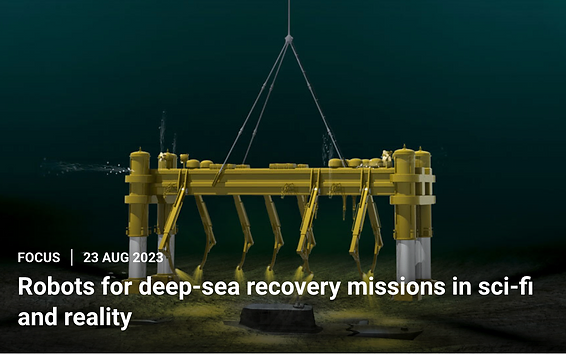Robots for deep-sea recovery missions in sci-fi and reality
A science fiction/science fact review of Three Miles Down by Harry Turtledove, the fictionalized version of the Hughes Glomar Explorer expedition 50 years before the OceanGate Titan tragedy. My new science fiction/science fact article for Science Robotics is out on why deep ocean robotics is hard. Especially when trying to bring up a sunken submarine […]


A science fiction/science fact review of Three Miles Down by Harry Turtledove, the fictionalized version of the Hughes Glomar Explorer expedition 50 years before the OceanGate Titan tragedy.
My new science fiction/science fact article for Science Robotics is out on why deep ocean robotics is hard. Especially when trying to bring up a sunken submarine 3 miles underwater, which the CIA actually did in 1974. It’s even harder if you’re trying to bring up an alien spaceship- which is the plot of Harry Turtledove’s new sci-fi novel Three Miles Under. It’s a delightful Forrest Gump version of that 1974 Hughes Glomar Explorer expedition. Though the expedition was 50 years before the OceanGate Titan tragedy, the same challenges exist for today’s robots. The robotics science in the book is very real, the aliens, not so much.
In 1974, the CIA deployed a 3 mile long, 6 million pound robot manipulator to recover a Russian submarine. The cover story was that Howard Hughes was deep sea mining for manganese nodules- which accidentally started everyone else investing in deep sea mining.
The Glomar Explorer was also a breakthrough in computer control, as the ship had to stay on station and move the arm to the sub in the presence of wind, waves, and currents. All with an array of 16-bit microprocessor, 5MHz clock, 32K words of core memory Honeywell computers. Consider that a late model iPhone uses a 64-bit microprocessor, a 3GHz clock, 6GB of RAM and a GPU.
Turtledove takes one major liberty with the otherwise hard science retrospective: the CIA recovering the Soviet sub was in turn a cover story masking the real mission to salvage the alien space ship that apparently collided with the sub!
The dry humor and attention to scientific details makes for an entertaining sci-fi compare-and-contrast between deep sea robotics and computers in the 1970s and the present day. It’s a fun read- not just for roboticists and computer scientists.
For further robotics science reading:
- about ROVs: https://rov.org/history/
- about the automatic station keeping system: The Jennifer Project
For further scifi reading, check out:













